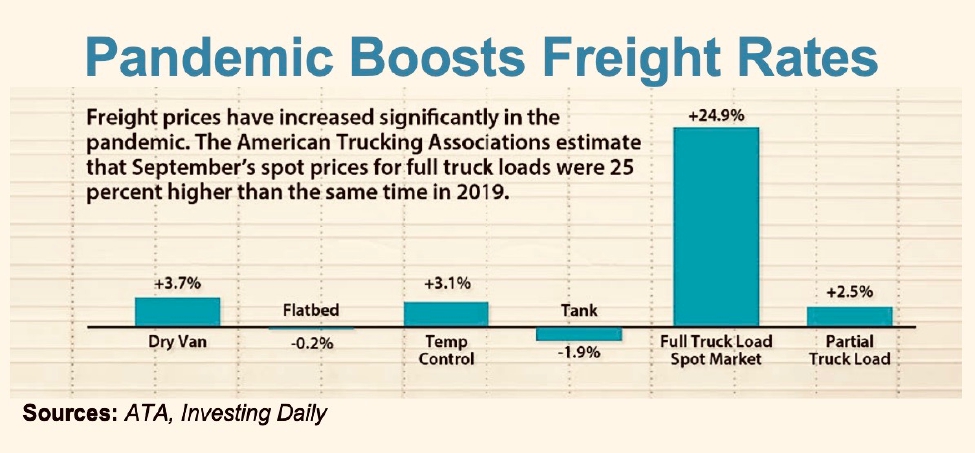Forget the cherished myths promulgated by country and western songs — there’s little freedom of the road for truck drivers these days, notes John Persinos, editorial director at Investing Daily.
Drivers with commercial trucking fleets spend their time behind the wheel under strict management from corporate headquarters, with almost every movement planned and monitored to make that trip as cost-effective as possible.
A crucial logistical tool is the fleet card, sometimes called a fuel card, used to pay for gasoline, diesel, and other fuels at gas stations. Fleet cards also are used to pay for vehicle maintenance and expenses.
This transportation trend is a long-term boon for FleetCor Technologies (FLT), the world’s leading provider of fleet cards and related payment processes for companies and government entities in 21 countries throughout North America, Latin America, Europe, and Australasia.
FleetCor’s flagship product is a special purpose business charge card for the commercial fuel industry. About 90% of the company’s revenue derives from the sale of these cards. Fleet cards eliminate the need for cash carrying, increasing the safety of drivers. The elimination of cash also helps prevent fraudulent transactions at a fleet owner or manager’s expense.
Headquartered in Atlanta, Georgia, FleetCor has a market capitalization of $18.1 billion and is the dominant firm in its field. In addition to fleet cards, the company sells a wide variety of customized fleet and lodging payment programs, as well as cards to buy fuel and lodging at participating locations.
The company also provides equipment that prevents unauthorized transactions involving sea-going vessels, locomotives, and mining and agricultural machinery.
Big Brother of the Big Rigs
Fleet cards enable managers to choose only the data they need and get it delivered to them quickly in any medium, typically the Internet. FleetCor also moved into the GPS monitoring of mobile workers, a practice that perhaps irks those under surveillance (as well as civil libertarians) but provides huge efficiencies for clients.
When integrated with fleet cards, these devices track virtually every movement of drivers and other personnel—anytime, anywhere—to curtail fraud, unauthorized activity and theft.
Tracking and analytical tools for card users are becoming more powerful and flexible, as risk management and cyber fraud detection move to the forefront of concerns for the trucking industry. Fleet cards allow fleet owners/managers to receive 24/7, real-time reports and establish purchase controls, allowing comprehensive management of all business related expenses.
Managers can request fleet card billing systems that generate highly detailed fuel receipts for drivers that specify filling station name city and state; truck number, license and mileage; driver’s license number; price per gallon and number of gallons bought; and time and date. FleetCor is in the best position to benefit from this growing use of mobile payments and highly granular monitoring.
Leading Indicator
FleetCor also will benefit from the trucking industry’s resurgence this year and into 2022, as overall economic activity improves in key markets such as North America. Supply chain disruptions caused by the coronavirus pandemic are lifting the fortunes of the transportation sector, as companies scramble to move goods through bottlenecks.
Once COVID fades, economic growth will continue boosting the transportation sector. The trucking industry is a leading indicator for the overall economy. As economic growth accelerates, customers start to ship more goods in expectation of stronger business conditions.
Trucks move roughly 72.5% of the nation’s freight by weight. The trade group American Trucking Associations (ATA) predicts that trucking volumes will rebound, rising 4.9% next year and then growing 3.2% per year on average through 2026. Overall freight revenues in 2020 totaled $879 billion, a number that’s expected to reach $1.435 trillion in 2031. Freight rates are picking up as well (see chart).

FleetCor also is developing new technologies to take advantage of the coming boom in self-driving trucks that are enabled with artificial intelligence. The company expects full-year earnings per share in the range of $13 to $13.10, with revenue in the range of $2.79 billion to $2.81 billion.
The average analyst expectation is for the share price to reach about $300 in 12 months, for an implied gain of about 35%. And yet, the stock’s 12-month forward price-to-earnings ratio is only 14.6. Hitch a ride with FleetCor, for both value and growth.










